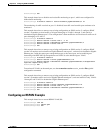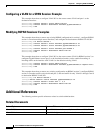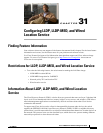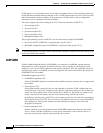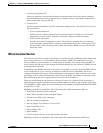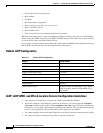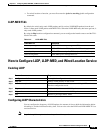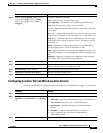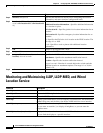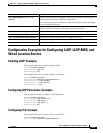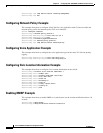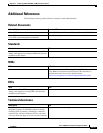
31-5
Cisco IE 2000 Switch Software Configuration Guide
OL-25866-01
Chapter 31 Configuring LLDP, LLDP-MED, and Wired Location Service
How to Configure LLDP, LLDP-MED, and Wired Location Service
• For wired location to function, you must first enter the ip device tracking global configuration
command.
LLDP-MED TLVs
By default, the switch only sends LLDP packets until it receives LLDP-MED packets from the end
device. It then sends LLDP packets with MED TLVs. When the LLDP-MED entry has been aged out, it
only sends LLDP packets.
By using the lldp interface configuration command, you can configure the interface not to send the TLVs
listed in this table.
How to Configure LLDP, LLDP-MED, and Wired Location Service
Enabling LLDP
Configuring LLDP Characteristics
You can configure the frequency of LLDP updates, the amount of time to hold the information before
discarding it, and the initialization delay time. You can also select the LLDP and LLDP-MED TLVs to
send and receive.
Note Steps 2 through 5 are optional and can be performed in any order.
Table 31-2 LLDP-MED TLVs
LLDP-MED TLV Description
inventory-management LLDP-MED inventory management TLV
location LLDP-MED location TLV (only on LAN Base image)
network-policy LLDP-MED network policy TLV (only on LAN Base image)
power-management LLDP-MED power management TLV
Command Purpose
Step 1
configure terminal Enters global configuration mode.
Step 2
lldp run Enables LLDP globally on the switch.
Step 3
interface interface-id Specifies the interface on which you are enabling LLDP, and enter
interface configuration mode.
Step 4
lldp transmit Enables the interface to send LLDP packets.
Step 5
lldp receive Enables the interface to receive LLDP packets.
Step 6
end Returns to privileged EXEC mode.



